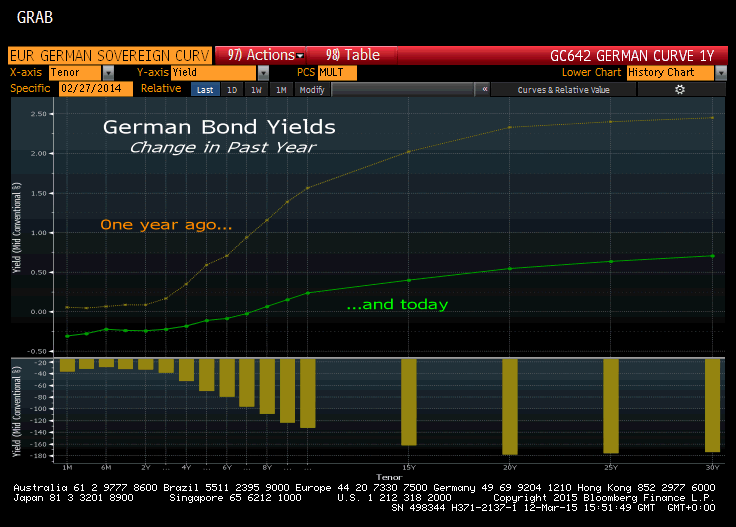글번호 : 53456110
작성일 : 15.03.14 | 조회수 : 259
| 제목 : Euro Debt Is Riskier Than Ever | 글쓴이 : eu-center |
|
|
|
|
Euro Debt Is Riskier Than Ever Mark Gilbert Mar 13, 2015
For those not intimately familiar with the world of government bonds, it may come as a surprise to learn that the overseers of financial markets still regard such securities as risk-free. When a bank lends to a company, it must have enough capital on hand to absorb potential losses. When it lends to a country, however, there's no such requirement. Government debt is, in the language of bank regulators, zero risk-weighted, ignoring centuries of history of sovereign defaults.
That's clearly absurd. But there's a renewed appetite in Europe to strengthen the rules. And forcing euro-area banks to allocate capital against their government-bond investments would have a useful side effect: It should make them more willing to offload their holdings to the European Central Bank's quantitative easing program, which kicked into action Monday. The program aims to buy 60 billion euros ($63 billion) of debt a month.
In a speech this month, Bundesbank board member Andreas Dombret made the case against the current system, which treats lending to governments as 100 percent safe:
All those who had trouble following that line of argument saw their doubts confirmed by the sovereign debt crisis in Europe. We obviously need to rethink the assumption that loans to governments are risk-free. Consequently, it appears urgently necessary to change the rules. If banks were required to hold capital against the risks of their government bond portfolios, that would make them more resilient to fiscal distress. At the same time, banks would have less incentive to buy large volumes of government bonds.
On Tuesday, Mario Draghi's European Systemic Risk Board published a report backing the argument for change, noting in particular that the more money banks allocate to government debt, the less they have to lend to companies. Both Dombret and the ESRB argued that concentration risk where a bank owns a lot of bonds from a single issuer, typically its domestic government should be addressed.
It's taking so long to reform what is clearly a bonkers system because governments quite like having captive buyers for their debt, even if it makes the world a riskier place. But with the euro bloc's hopes riding on QE goosing the economy, this might be an unmissable opportunity for reform.
One of the concerns about the ECB's bond-buying program is that banks won't be willing to sell sufficient bonds to meet the central bank's target of adding 1.1 trillion euros to its balance sheet. With yields getting ever more negative across the European bond market, and the economic outlook still deterring companies from borrowing to invest, there's a scarcity of places to put the cash you get from selling to the ECB. For example, look at what's happened to German yields in the past 12 months:
ECB board member Ewald Nowotny said a scary thing Wednesday: "I don’t think one can assume that we will have a very long phase of negative yields if this program is successful." In other words, judge the success of QE by whether it turns yields back to positive which in turn means if QE is effective, yields will rise, prices will plummet, and investors will be handed losses.
It's a crazy world when a central bank is engineering policies that, if they work, will trash the value of government debt. It highlights the riskiness of banks stuffing their balance sheets with the debts of their own nations. And it emphasizes that removing the zero risk-weighting for sovereign debt is long overdue.
source http://www.bloombergview.com/articles/2015-03-13/euro-debt-is-riskier-than-ever
|
|

